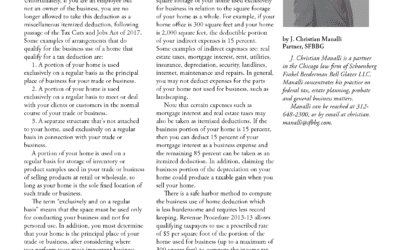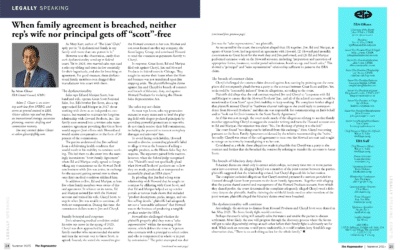“True friends stab you in the front,” noted Oscar Wilde, and a recent Illinois decision vividly illustrates the famed playwright’s point.
Plaintiffs Brian and Nicole Kelly were not only friends with defendants Larry Orrico and Renae Yockey, they lived two doors down from them in suburban Itasca. And when the Kellys first considered selling their posh home, it was Orrico and Yockey who responded first.
The couples signed a $1.2 million purchase contract in July 2007. Nicole, a real estate broker, agreed to list the defendants’ house. A May 2008 closing date was later extended to August.
So far, so good.
Come May 2008 when the defendants’ house hadn’t sold, the Kellys recalled hearing they could not proceed under the purchase contract. Brian answered the defendants that the purchase contract was not contingent on a sale of the defendants’ house.
Brian also told the defendants Nicole would now list their own house for sale. Before long, another couple, the DiSilvestros, offered to purchase the Kellys’ property for the same $1.2 million. Yet, this would not get defendants quite off the hook.
Nicole’s involvement meant a $30,000 brokerage commission would be due at closing. Brian recalled calling Yockey in June 2008 about the new offer, and to demand that the defendants pay the commission. Yockey refused.
“She didn’t feel obligated to pay the commission,” Brian would later testify, “and I just said OK, and that was that.”
The Kellys’ attorney then twice wrote defendants, asserting they breached their purchase contract, letters that went unanswered. Meanwhile, the DiSilvestros defaulted on their purchase contract, and the Kellys pocketed their $50,000 in earnest money.
The house eventually sold to another buyer in May 2009, but for just $1 million. To collect the $200,000 shortfall, the Kellys filed a one‐count complaint in DuPage County alleging that the defendants breached their purchase contract.
Brian acknowledged on cross‐examination at trial that he never received written notice from the defendants that they would not close: “It was a verbal from them.”
Nicole testified at trial that after the defendants reported in May 2008 that they couldn’t close, she told the defendants: “Well, we’ll try to get another buyer. And that way, that will relieve you your obligation if we can get another buyer for the same price.” She admitted on cross‐examination that when the defendants refused to pay the $30,000 commission in June, she stopped listing their home.
To no surprise, Yockey and Orrico remembered the May 2008 conversation rather differently. They testified at trial that the Kellys agreed to list their own home as a means to draw more traffic to the defendants’ property.
Both defendants insisted they never told plaintiffs they would not close on their house.
In fact, the defendants were obtaining a bridge loan, according to Yockey, so they could close on the Kelly house — even if theirs didn’t sell. And she remembered Brian asking her in the June 2008 call whether the plaintiffs should sell to the DiSilvestros. Due to the lack of interest in the defendants’ home, she told him to proceed.
Once Brian indicated they had another purchaser, she was “under the impression that we were done.” Yet, she admitted on cross‐examination that their purchase contract contained neither a sale‐of‐home nor a financing contingency.
Orrico added his view that the plaintiffs’ contract with the DiSilvestros released the defendants from their purchase contract, but admitted never conversing with the plaintiffs about getting released or obtaining documentation releasing them.
Strangely, he even testified about informing his attorney that the plaintiffs signed another contract to sell their house. Even in this apparent attorney‐client communication, however, Orrico never claimed the purchase contract was canceled.
The trial court sided with the plaintiffs, accepting that by informing the Kellys they couldn’t perform under the purchase contract, the defendants anticipatorily breached. Apparently crediting the defendants with the amount of the DiSilvestros’ forfeited earnest money, the trial judge entered judgment for $150,000.
The 2nd District Appellate Court found one small problem with the finding that the defendants anticipatorily repudiated: the plaintiffs neither pleaded nor sought relief under such a theory.
The plaintiffs’ complaint sounded only in breach of contract, and anticipatory repudiation of a contract “involves a distinct theory of relief,” the 2nd District rule in Kelly v. Orrico, 2014 IL App (2d) 130002. It is “premised on a party’s clear manifestation of its intent not to perform under the contract.”
Rejecting the plaintiffs’ assertion that defendants knew both theories were at play with “no question whatsoever,” the appellate court found the plaintiffs’ failure to allege anticipatory repudiation of the purchase contract meant such proof at trial was erroneously admitted.
The court also rejected the plaintiffs’ claim that any issues with the pleadings were waived when the defendants failed to object to the evidence of anticipatory breach, either at trial or in a post‐trial motion. Turning the argument around, the court noted that section 2‐616(c) of the Code of Civil Procedure authorizes the amendment of pleadings “at any time, before or after judgment to conform the pleadings to the proofs,” and faulted the plaintiffs for never seeking leave to amend.
In dicta, the court also considered the sufficiency of the evidence and found no clear manifestation by the defendants of an intent not to perform. Anticipatory breach is “not a remedy to be taken lightly,” and the court found the plaintiffs’ own actions caused the defendants to change their position, while the defendants’ actions “at best, created an ambiguous implication as to whether they would perform under the contract.”
Evidence supporting this finding included the Kellys’ listing their home for sale after the purchase contract was signed and then contracting with the DiSilvestros, and Brian responding “OK” when Yockey refused to pay the $30,000 commission, before testifying later “that was that.”
Even if the defendants did repudiate, their actions occurred only after they were notified the Kellys had another buyer, which combined with Nicole’s ending her listing of the defendants’ home after the commission fee was not paid “amounted to a forfeiture of the plaintiffs’ claim against defendants.”
This unneighborly tale harkens back to Oscar Wilde, or perhaps a contemporary interpretation by the aptly named rock band Say Anything, who crooned: “Theyʹre turning away from me, backstabbing places they roam. My friends are just neighbors that steal from me when Iʹm not home.”



